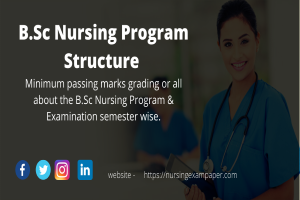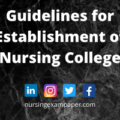Get detail about What is BSc Nursing Program? Guidelines for Establishment of B.Sc (Nursing) College of Nursing, Facilities, and Eligibility Criteria Nursing Programs. Admission Terms and Conditions Qualifications & experience of teachers of the college of Nursing. Scheme of Examination, Courses, Subjects, Syllabus, fees, and BSc nursing application form, etc.
Bachelor of Science in Nursing or BSc Nursing Program is a 4-year undergraduate course. BSc Nursing admission is based on entrance exams held between April-June. The minimum eligibility criterion for pursuing this course is the successful completion of 10+2 level of education in Physics, Chemistry, and Biology.
I. OVERVIEW OF THE PROGRAM
The BSc nursing degree program is a four-year full-time program comprising eight semesters. which prepares a student to become a registered nurse qualified to practice in a variety of settings in either public/ government or private healthcare settings. It adopts a credit system and semester system as per UGC guidelines. The program encompasses foundational, core and elective courses. The choice-based system is applicable to electives only and is offered in the form of modules. Modular learning is also integrated into the foundational as well as core courses that are mandatory.
The BSc Nursing program prepares nurses for generalist nursing practice. Knowledge acquisition related to wellness, health promotion, illness, disease management, and care of the dying is core to nursing practice. Mastery of competencies is the main focus. Students are provided with opportunities to learn a whole range of nursing skills in addition to acquiring knowledge related to nursing practice. This is achieved through learning in skill lab/simulated labs and the clinical environment. The simulation will be integrated throughout the curriculum wherever feasible to enable them to develop competencies before entry into the real field of nursing practice.
The revised curriculum embraces a competency-based approach throughout the program integrating mastery learning and self-directed learning. Through the educational process, the students assimilate and synthesize knowledge, cultivate critical thinking skills and develop care strategies. Competencies that reflect practice standards of the Indian Nursing Council (INC) address the areas of cultural diversity, communication technology, teamwork and collaboration, safety, quality, therapeutic interventions, and evidence-based practice. They are prepared to provide safe and competent care to patients across life span and influence patient outcomes.
II. PHILOSOPHY
Indian Nursing Council believes that:
Health and wellness are two fundamental concepts that are integrated throughout the program. Health is a state of well-being that encompasses physical, psychological, social, economic and spiritual dimensions. Wellness is the individual’s perception of wellness and is influenced by the presence of disease and an individual’s ability to adapt. Health is a right of all people. Individuals have a right to be active participants in achieving health as they perceive it. Society consists of dynamic and interactive systems involving individuals, families, groups, and communities. Cultural diversity, race, caste, creed, socio-economic levels, religion, lifestyles, changes in the environment and political factors influence it. Nurses recognize and respect human differences and diversity of population within society and provide ethical care with respect and dignity and protect their rights.
Nursing as a profession and a discipline utilizes knowledge derived from arts, sciences (physical, biological and behavioral), humanities and human experience. Nursing science incorporates clinical competence, critical thinking, communication, teaching-learning, professionalism, and caring and cultural competency. Nurses collaborate with other health disciplines to solve individual and community health problems. Nursing facilitates evidence-based practice, compassionate caring among its practitioners in response to emerging issues in healthcare and new discoveries and technologies in the profession. Nursing practice requires a personal commitment to professional development and life-long learning.
The scope of nursing practice encompasses the provision of promotive, preventive, curative and rehabilitative aspects of care to people across the life span in a wide variety of healthcare settings. Nursing practice is based on an acquisition of knowledge, understanding, attitude, competencies, and skills through INC’s curricular and practice standards and proposed Indian Nursing and Midwifery Council Act (Includes Nurse Practice Act). The competencies in which the students are trained will guide them in performing their scope of practice. Nursing offers qualified nurses a wealth of opportunities in the field of practice, education, management and research in India and overseas.
The undergraduate nursing program is broad-based education within an academic curricular framework specifically directed to the development of critical thinking skills, competencies appropriate to human and professional values. The teaching-learning process is focused on mastery learning, modular, self-directed and self-accountable in choice making in terms of elective courses. The program prepares its graduates to become exemplary citizens by adhering to the code of ethics and professional conduct at all times in fulfilling personal, social and professional obligations so as to respond to national aspirations.
Health and community orientation are provided with special emphasis on national health problems, national health programs and national health policy directives to achieve universal health care for all citizens of India. The main roles of graduates would-be provider of care with beginning proficiency in delivering safe care, coordinator/manager of care by being an active participant of an inter-professional team and member of a profession demonstrating self-responsibility and accountability for practice as well as to support the profession.
The faculty has the responsibility to be role models and create a learning environment that facilitates the cultivation of critical thinking, curiosity, creativity and inquiry-driven self- directed learning and attitude of life-long learning in students. Learners and educators interact in a process whereby students gain competencies required to function within their scope of practice.
III. AIMS
The aims of the undergraduate program are to
- Produce knowledgeable competent nurses with clear critical thinking skills who are caring, motivated, assertive, and well-disciplined responding to the changing needs of the profession, healthcare delivery system, and society.
- Prepare graduates to assume responsibilities as professional, competent nurses and midwives in providing promotive, preventive, curative, and rehabilitative healthcare services in a hospital or public health settings.
- BSc Nursing Program Prepare nurses who can make independent decisions in nursing situations within the scope of practice, protect the rights of individuals and groups and conduct research in the areas of nursing practice and apply evidence-based practice.
- Prepare nurses to assume the role of the practitioner, teacher, supervisor, and manager in clinical or public health settings.
IV. CORE COMPETENCIES FOR NURSING PRACTICE BY BSC GRADUATE
The BSc Graduate nurse will be able to:
1.Patient-centered care
Provide holistic care recognizing individual patient’s preferences, values, and needs, that is compassionate, coordinated, age and culturally appropriate safe and effective care
2. Professionalism
Demonstrate accountability for the delivery of standard-based nursing care as per INC standards that are consistent with moral, altruistic, legal, ethical, regulatory and humanistic principles.
3. Leadership
Influence the behavior of individuals and groups within their environment and facilitate the establishment of shared goals.
4. System-based practice
Demonstrate awareness and responsiveness to the context of the healthcare system and the ability to manage resources essential to provide optimal quality of care.
5. Health informatics and Technology
Use technology and synthesize information and collaborate to make critical decisions that optimize patient outcomes.
6. Communication
Interact effectively with patients, families, and colleagues fostering mutual respect and shared decision making to enhance patient satisfaction and health outcomes.
7. Teamwork and Collaboration
Function effectively within nursing and interdisciplinary teams, fostering open communication, mutual respect, shared decision making, team learning, and development.
8. Safety
Minimize risk of harm to patients and providers through both system effectiveness and individual performance.
9. Quality improvement
Use data to monitor the outcomes of care processes and utilize improvement methods to design and test changes to continuously improve the quality and safety of the healthcare system.
10. Evidence-based practice
Identify, evaluate, and use the best current evidence coupled with clinical expertise and consideration of patient’s preferences, experience, and values to make practical decisions.
All components included in the BSC Nursing Program
For more detail about B.Sc Nursing program Visit — http://www.indiannursingcouncil.org/





